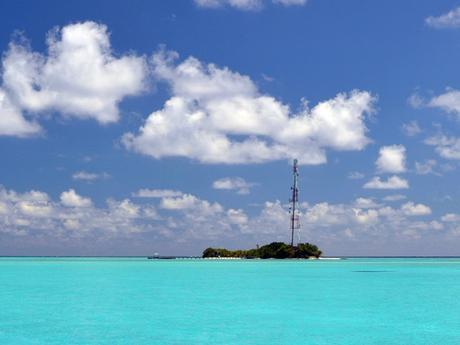
How do you get ready to be self-sufficient for weeks or months at a time? In just a few hours, Totem will be underway for Chagos. We have a four week permit for this atoll (populated mainly by coconut crabs), and we don’t expect to arrive in Seychelles until late June. Until then? No markets. No hardware stores. No mobile network. No internet. We will be well and truly off the grid.
I’m not a bucket list kind of person, but Chagos is a bucket list kind of place. This 55-island archipelago in the middle of the Indian Ocean (pretty much smack in the middle) has long been a haven for cruisers. The only “residents” of the archipelago are government and military facilities; on the islands where we’re allowed to anchor, only ruins remain of past settlements. It’s about as remote as you can get.
Provisioning
Provisioning for six weeks sounds scary on the surface, but really isn’t too big a deal. If anything, we’re over-provisioned, and without a ton of effort- just gradually filling in gaps over the last few weeks when we were able, then walking to shops in the final days with what we can carry. This shop is typical: when the boat (or plane) comes in, their produce department (those bins, and the fridge) are filled.
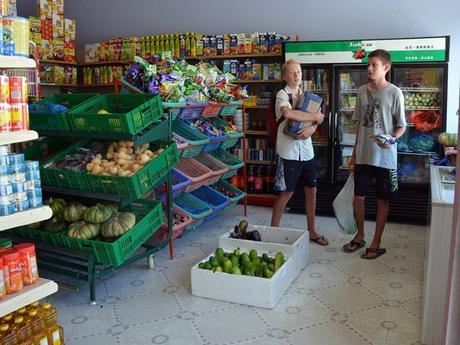
I have a spreadsheet I made in Mexico which helped us in 2009 when we prepared for weeks up in the Sea of Cortez, and in 2010 when we provisioned for months in the Pacific. Back then, it was literally my shopping list. Now, it’s more of a guideline to make sure we don’t miss anything important (it would be lousy to run out of toilet paper).
After some years of practice, we know what works for us and what doesn’t. Canned food doesn’t, generally, but when the only fresh options are fish and coconuts it will add some variety. At least now I know not to buy canned fruit (gross) and moderate any purchases, because you can overdose on even tried and true meals if you don’t mix things up enough. We’re realized that only a few canned vegetables are remotely palatable, and instead do our own preserving. What you miss, when you’re some time/distance from being able to buy fresh produce, is that crunch. Well, the beans and carrots I’ve pickled here in Maldives will serve very nicely; there’s no need for puke-green-pea-pablum, which I suspect is nutritiously worthless anyway. Growing sprouts will help too.
Storing properly helps tremendously to extend the life of fresh produce. We only recently finished onions that were purchased in Malaysia (close to four months ago) and tomatoes we bought in Sri Lanka (more than two months ago), so looking ahead six weeks feels less intimidating. The produce we can keep from Maldives are backed up with a baseline of staples: flour, coffee, sugar, eggs, etc. And of course, we do hope to catch some fish, and harvest coconuts, and otherwise supplement our diet along the way.
WHAT, no internet?
Of course, there’s no internet service in Chagos to tap into. And yes, I do love my internet access. For years, our at-sea / off-the-grid comms were radio based. But since we’ve added an Iridium GO! unit, we’ll be able to stay more connected. This satellite powered wifi lets us send and receive email, text messages, and keep up with Totem’s twitter; tweets will re-post on our Facebook page. I expect to use the Iridium GO! to update the blog, too, just in a more text-based fashion than usual.
Hopefully we can get the narrow-pipe browser working I’ll be able to see and respond to comments, but browser access been problematic. We use an iPad to access the GO!, and unfortunately, Apple products don’t play nicely with others. So we borrowed an android smartphone from friends and hope that will help. But still, I may get twitchy. Because… Six. Weeks.
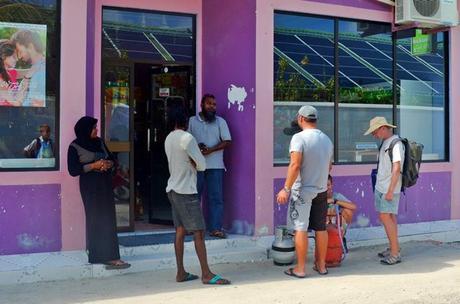
Life Maintenance
It’s unusual to go for such a long stretch without reasonably predictable internet access. And that online access it pretty convenient. We have a house back on Bainbridge Island that’s getting painted, and tenants that may stay or move at the end of the lease in July. My parents have managed getting bids and assigning the painting work, which is so incredibly helpful, and by the time we arrive in Seychelles the “after” photos will be old news. Hopefully, our current tenants (gold star, wonderful family) will renew. A good friend manages rental issues for us, but we don’t want to make it any more difficult than necessary- you k now, like by being unable to send documents back and forth by going to Chagos. Whoops!
Then there are the inconveniences. Like paying taxes, which we’re struggling to complete because the company that holds our mortgage STILL has not provided us with a (required, supposed to have been sent by February) interest statement document. And now, we’ll probably end up late because we don’t have it (expat taxes aren’t due in April; they’re due in June. we’re not late yet, except… right, no phone / no internet!). O how about the inconvenience that our two credit cards will expire near the same time, when we’re least able to do much about it? The plastic doesn’t get that much use, but does have recurring charges (like our mail forwarding service in Seattle, or the monthly fees for our Iridium GO!’s data plan) that could really cause problems if they aren’t paid on time. Ahhhhh… not the end of the world. But inconvenient, yes.
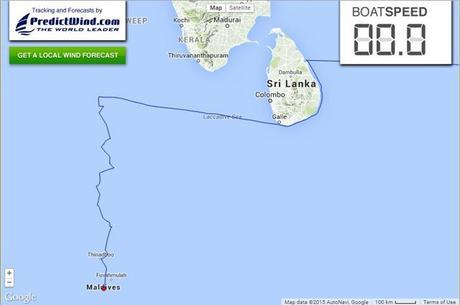
You’re where?
When you are remote, there is great comfort in being able to communicate your exact location. There are a number of ways to share your vessel position, whether you want to keep it to a few friends and family or cast a wider net. Our anchorages (and 24 hour position updates on passages) are posted to Farkwar, and I can tag each update with a note about what’s happening. Friends of ours can subscribe there to get updates, and they’ll post to our social channels.
The GO! posts an update every hour to Totem’s PredictWind track page with our location and speed. From PredictWind forecasts and vessel reports, we’re expecting big current, which could make it exciting; we’re also expecting a fair bit of motorsailing, which will not be exciting at all. I can email a position from the GO! to a handful of dear ones with a couple of button pushes on the unit. Easy.
Boat readiness
Our prep for this relatively short passage is a lot more streamlined than passage prep before leaving Southeast Asia. But Jamie nothing if not thorough, and does a careful walk through, checking rigging and systems. Yesterday pulled the head apart (because that’s what you do on your birthday, if the head isn’t flushing) and today, he and Niall tested bilge pumps and replaced a section of hose. It looks more like routine maintenance than the prep from a few months ago.
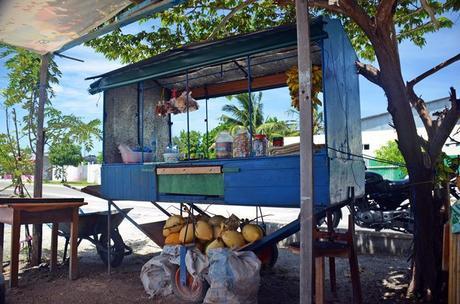
The history of Chagos isn’t so pleasant, and the future is uncertain: if you’re curious, check out the documentary Stealing a Nation (free to stream! we haven’t had data to spare for watching yet, but it comes highly recommended).
Thanks for reading this on Sailfeed!

